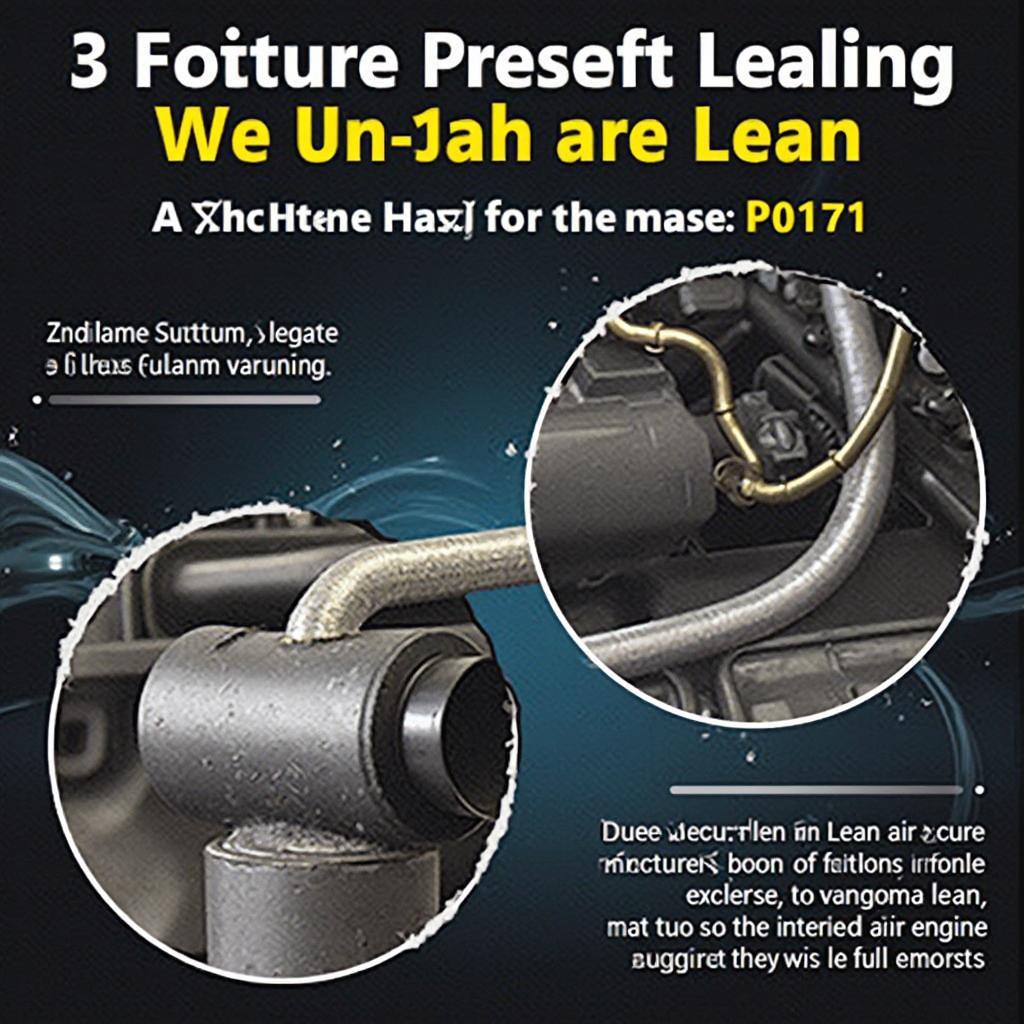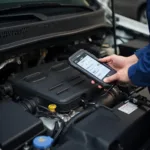The dreaded P0171 OBD2 code, indicating a “System Too Lean (Bank 1)” condition, can be a real headache for car owners. This code signifies that the engine’s air-fuel mixture in bank 1 is running lean, meaning there’s too much air and not enough fuel. Understanding this code is crucial for effective troubleshooting and repair. Let’s dive deep into the causes, symptoms, diagnostic procedures, and solutions for the P0171 code.
A lean air-fuel mixture can lead to reduced engine performance, increased emissions, and even potential engine damage. This article will equip you with the knowledge to address this issue effectively and get your car back on the road. You can learn more about how an obd2 scanner p0171 can help you diagnose this issue.
What Does P0171 Mean?
The P0171 code specifically points to a lean condition in “Bank 1.” In vehicles with multiple cylinder banks (V6, V8, etc.), Bank 1 typically refers to the side of the engine containing cylinder number one. A lean air-fuel mixture disrupts the optimal combustion process, affecting engine performance and efficiency.
Common Causes of P0171
Several factors can contribute to a P0171 code. Identifying the root cause is essential for effective repair. These causes include:
- Vacuum Leaks: Leaks in the intake manifold, vacuum hoses, or gaskets can introduce unmetered air into the engine, leaning out the mixture.
- Faulty Mass Air Flow (MAF) Sensor: The MAF sensor measures the amount of air entering the engine. A malfunctioning sensor can provide inaccurate readings, leading to an incorrect air-fuel mixture.
- Faulty Oxygen (O2) Sensor: The O2 sensor monitors the exhaust gases and provides feedback to the engine control unit (ECU) to adjust the air-fuel ratio. A faulty sensor can cause the ECU to incorrectly adjust the mixture.
- Fuel Pressure Issues: Low fuel pressure, caused by a weak fuel pump or clogged fuel filter, can restrict the amount of fuel reaching the engine.
- Fuel Injector Problems: Clogged or leaking fuel injectors can disrupt the proper fuel delivery, leading to a lean condition.
- Exhaust Leaks: Leaks in the exhaust system before the oxygen sensors can also cause inaccurate readings and lead to a P0171 code.
Symptoms of a P0171 Code
Recognizing the symptoms of a P0171 code can help you diagnose the problem early. Common symptoms include:
- Check Engine Light: The most obvious sign is the illuminated check engine light on your dashboard.
- Rough Idle: The engine may idle erratically or stall.
- Hesitation or Stalling: The car might hesitate or stall during acceleration.
- Reduced Fuel Economy: A lean mixture can lead to decreased fuel efficiency.
- Misfires: In severe cases, a lean mixture can cause engine misfires.
How to Diagnose P0171
Diagnosing the P0171 code involves a systematic approach:
- Retrieve the Code: Use an obd2 scan codes list p0171 to confirm the P0171 code.
- Inspect for Vacuum Leaks: Check for leaks in the intake manifold, vacuum hoses, and gaskets using a visual inspection or a smoke test.
- Check the MAF Sensor: Inspect the MAF sensor for dirt or damage and test its functionality using a multimeter.
- Test the O2 Sensor: Test the O2 sensor’s voltage readings using a multimeter.
- Check Fuel Pressure: Measure the fuel pressure using a fuel pressure gauge.
- Inspect Fuel Injectors: Test the fuel injectors for proper spray pattern and flow rate.
How to Fix P0171
Once you’ve identified the root cause, the appropriate repair can be made:
- Repair Vacuum Leaks: Replace damaged vacuum hoses, gaskets, or repair the intake manifold as needed.
- Replace Faulty MAF Sensor: Install a new MAF sensor if the old one is malfunctioning.
- Replace Faulty O2 Sensor: Replace the faulty oxygen sensor.
- Address Fuel Pressure Issues: Replace a weak fuel pump or clogged fuel filter.
- Clean or Replace Fuel Injectors: Clean or replace clogged or leaking fuel injectors.
- Repair Exhaust Leaks: Repair any leaks in the exhaust system before the oxygen sensors.
You can find helpful resources on troubleshooting specific car models, for example, obd2 codes hyundai accent.
What Happens if You Ignore P0171?
Ignoring the P0171 code can lead to further engine damage and increased emissions. Continued driving with a lean mixture can damage the catalytic converter and even cause engine overheating or failure.
Conclusion
The OBD2 code P0171, signifying a lean air-fuel mixture in bank 1, requires prompt attention. By understanding the causes, symptoms, and diagnostic procedures outlined in this article, you can effectively address this issue and prevent further engine damage. Utilizing a quality obd2 scanner codes p0171 is crucial for accurate diagnosis. Remember, timely repair can save you money and ensure the longevity of your vehicle’s engine.
FAQ
- What does a P0171 code mean? It indicates a lean air-fuel mixture in engine bank 1.
- Can a vacuum leak cause a P0171 code? Yes, vacuum leaks are a common cause.
- What are the symptoms of a P0171 code? Rough idle, hesitation, stalling, reduced fuel economy, and misfires.
- How do I fix a P0171 code? Repair the underlying issue, such as vacuum leaks, faulty sensors, or fuel system problems.
- Is it safe to drive with a P0171 code? While you might be able to drive short distances, it’s not recommended as it can cause further damage.
- Can a dirty MAF sensor cause a P0171 code? Yes, a dirty or faulty MAF sensor can contribute to this issue.
- How much does it cost to fix a P0171 code? The cost varies depending on the underlying cause and repair required. A cheap obd2 bluetooth code reader can help you get started.
Need further assistance? Contact us via WhatsApp: +1(641)206-8880 or Email: [email protected]. Our customer support team is available 24/7.


